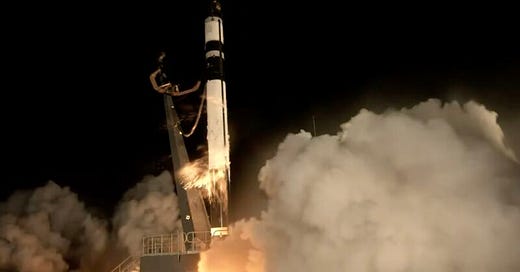Moonshot #14
Rocket Lab and Galactic Energy's failed launches, Blue Origin's leadership changes, and Sierra Space raises nearly $300 million
Hello Continuum readers and Celestial Citizens,
Welcome back to Moonshot where we will give a bi-weekly rundown of all the private sector space news. If you haven’t already, consider becoming a paid subscriber ($6/month) so you can get past that pesky paywall and read the full Moonshot post!

Rocket Lab – In just over two years, Long Beach-based Rocket Lab carried out 19 missions without failure, quickly becoming the second most active launcher in the U.S. behind SpaceX. So enamored were we with their delightful names from “Baby Come Back” to “Rocket Like a Hurricane” that we may have forgotten that they, like any other, are not impervious to technical missteps. Unfortunately, last week the company suffered their first failed launch since May 2021, resulting in the loss of a payload from partner Capella Space and a drop in their stock by about 7.5% at the end of its launch day in the United States. The uncrewed Electron mission, titled “We Will Never Desert You,” took off from the company’s New Zealand complex on September 19th before experiencing an anomaly with the second stage ignition. While certainly a setback, CEO Peter Beck assures that Rocket Lab will “find it, fix it and be back on the pad quickly.” We believe in them, as their 90% success rate still positions them favorably amongst their competitors.
Galactic Energy – Suffering a similar misfortune was Chinese launch giant Galactic Energy, who lost a Changguang Satellite Technology satellite this past week after experiencing a system anomaly with its Ceres-1 rocket. This mission, dubbed the Autumn Sonata, was the tenth launch for the company and first failure. Of course, the mission’s unfavorable outcome could chip away at Galactic Energy’s reputation, but with the company’s innovative mobile sea platform and reusable rocket set to debut next year, they have the tools to land on their feet.

Blue Origin – Bezos is switching things up and putting in a new CEO for space subsidiary Blue Origin. Former Amazon executive Dave Limp will take over for Bob Smith, who after six years of running the company announced his resignation last Monday. While Smith led the company through its growth from 1,500 to over 11,000 employees, he had not been able to lead the company through a successful launch to orbit. Of course, Limp’s history heading “several major projects for Amazon.com” such as everyone’s favorite audio stalker Alexa voice assistant doesn’t necessarily scream experience in the space sector. However, the new CEO does have somewhat of a history with Amazon’s satellite constellation brainchild Project Kuiper, as well as Bezos’ vote of confidence, attributing him with “an outstanding sense of urgency, brings energy to everything, and helps teams move very fast.” Speed is obviously of utmost importance to Bezos at the moment, as he hopes to get suborbital launcher New Shepard, heavy launcher New Glenn and hopeful Artemis lunar lander Blue Moon into action A.S.A.P. Not to mention, dealing with the rumors/early indicators that the Orbital Reef partnership between Blue and Sierra Space are falling apart. And, well, there’s the vote of confidence from the Blue Origin employees, who state that “anything is better than Bob.” Ouch.
SpaceX – The Starlink mega constellation had quite a bit of work done these last couple weeks, with SpaceX launching 22 satellites on September 20th and 22 more on September 23rd from Florida, plus 21 satellites from California during the wee hours of Monday, September 25th. The launch on the 20th set a reuse record for the company, as it was the 17th return landing of a Falcon 9 booster. Today, as the constellation nears 5,000 total satellites, the company touts the network’s over 2 million subscribers across 60 countries. Musk is already preparing for his legacy, recently donating a rocket engine from 2019 to the Smithsonian’s National Air and Space Museum in Washington, D.C.
Astroscale – Refueling vehicles could be the future’s hottest commodity, as all of these satellites we’ve been popping up into the cosmos continue to run out of steam. Astroscale, an on-orbit services provider headquartered in Japan with a Colorado-based U.S. subsidiary recently made a deal to co-invest in a refueling satellite with the American Space Systems Command. Via an OTA contract, the U.S. Space Force will award the company $25.5 million while Astroscale will put in $12 million of its own money towards the project. Astroscale beat out 22 other bids for the contract and will continue to fight to meet the Space Force’s expectations and consequently conduct a demonstration in the coming years.

Sierra Space – Colorado-based aerospace company Sierra Space’s fantasies to launch their Dream Chaser space plane may soon become reality after raising nearly $300 million in a recent funding round led by three Japanese investors. Though the spacecraft – which hopes to one day carry cargo and crew to Low Earth Orbit – has been in development for years, delays in ULA’s Vulcan rocket affected the Dream Chaser’s timeline. Hopefully, this fresh funding breathes new life into the space plane as well as the company’s private space station development project.
Keep reading with a 7-day free trial
Subscribe to Celestial Citizen to keep reading this post and get 7 days of free access to the full post archives.



